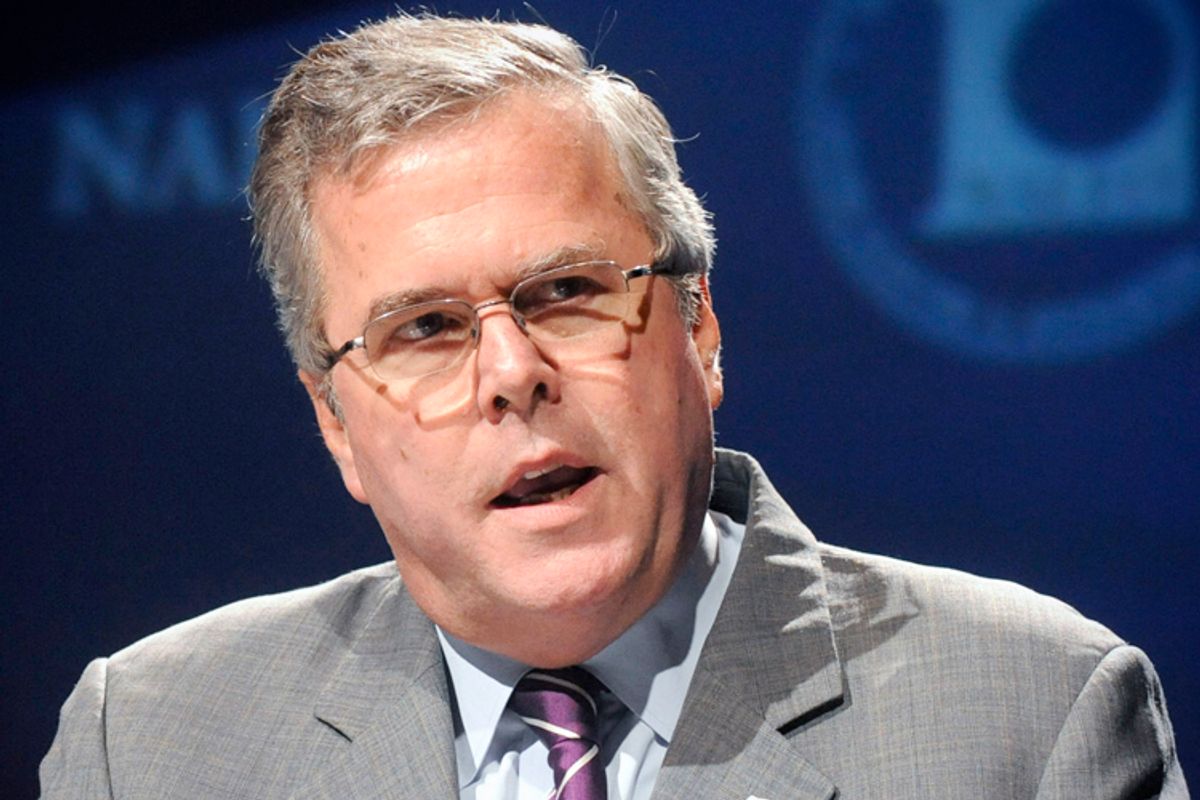Jeb Bush's all-but-formally-announced presidential campaign rests on a simple rationale: By spurning the GOP's incendiary brand of conservatism and offering voters what he calls an "optimistic message," the former Florida governor offers the Republican Party a plausible path to the recapturing the presidency in 2016. Bush vows that he won't pander to the rabid right-wing base, sanctimoniously pronouncing himself prepared to "lose the primary to win the general without violating your principles." But is Bush truly the candidate best-positioned to lead the GOP to a general election victory? A growing body of evidence suggests otherwise.
The latest indication came Tuesday morning, with Quinnipiac University's release of a survey of Ohio, Pennsylvania, and Florida, three crucial swing states. Bush did not lead likely Democratic nominee Hillary Clinton in any of the states; the closest he came was in his home state, where he's locked in a statistical tie with the former Secretary of State, who takes 44 percent of the vote to Bush's 43 percent. Meanwhile, Clinton leads Bush 47 percent to 36 percent in Ohio and 50 percent to 35 percent in Pennsylvania.
Of course, it's early yet, and given that Clinton struggles to break 50 percent in most matchups with her prospective rivals, her lead is hardly insurmountable. But what's particularly troubling for Bush is that he performs about the same as other potential GOP contenders; only in Florida does Bush appear to offer his party a unique advantage. Meanwhile, in Ohio -- a state every victorious Republican nominee has carried -- Clinton leads New Jersey Gov. Chris Christie 47 percent to 34 percent; Kentucky Sen. Rand Paul 48 percent to 36 percent; and former Arkansas Gov. Mike Huckabee 49 percent to 34 percent. In Pennsylvania, Clinton bests Christie 50 percent to 39 percent; Paul 53 percent to 34 percent; and Huckabee 54 percent to 34 percent.
The results dovetail with national polls casting further doubt on Bush's electability argument. In RealClearPolitics' polling averages, Bush trails Clinton by 9.2 points, a margin equivalent to Christie's deficit and on par with Paul's 10.5-point disadvantage. Huckabee performs worse, trailing Clinton by 15.4 points.
Such results present Bush with a problem similar to that faced by Christie, another potential candidate who has riled the GOP base with occasional heterodoxies on issues like immigration reform and the Common Core education standards. Christie's boosters once argued that the blue-state governor fit the profile of the candidate needed to defeat Clinton; he was an executive, considered relatively moderate, and had demonstrated cross-over appeal in his 2013 re-election campaign. But Bridgegate and other controversies have eroded Christie's standing in the national polls, leaving conservative voters asking why they should hold their noses and support him in the primary if he performs no better than other Republicans against Clinton. Bush skeptics are likely to ask themselves the same question when weighing a vote for him.
Unlike Christie, who now struggles to break through in national GOP polls, Bush leads other contenders in surveys of the presidential field, and he admittedly has locked up support among much of the well-heeled donor class, which once pined for President Christie. But Bush's lead is soft; he only garners about 16 percent support on average, underscoring that there's ample opportunity for a well-funded rival candidate to dislodge him.
Wisconsin Gov. Scott Walker is an excellent position to emerge as that candidate. The union-buster is a favorite of both the business class and the Tea Party, and therefore a potentially unifying figure for a party riven by internal divisions. Moreover, Walker has a far more credible electability case to make than Bush. While Walker has won three gubernatorial elections in a blue state in the past four years, Bush ran his last campaign in 2002, amid a vastly different political environment. With a poll released this weekend suggesting that Walker has moved to the top of the GOP field in Iowa, the state that kicks off the presidential nominating contests, Bush looks far from secure.

Shares